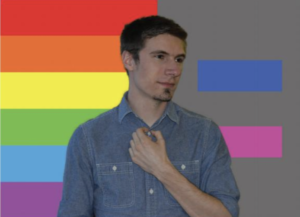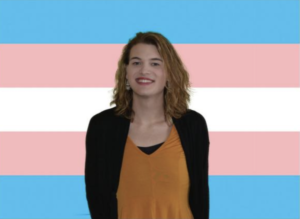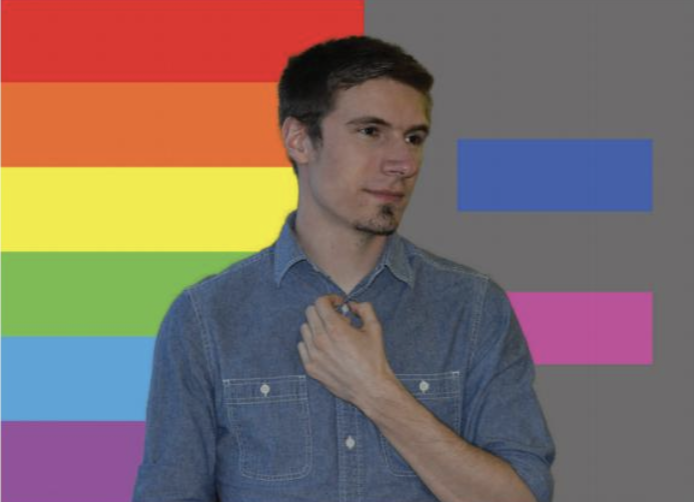By Mary Ellen Aldrich, Arts & Culture Editor
When presented with the word ‘identity’ nearly everyone will think of something different. The definition of ‘identity’ according to the English Oxford dictionary is, “the fact of being who or what a person or thing is.” Identity, however, can go deeper than that and is frequently more complex than a single sentence can explain.
For Nate, a non-matriculated ASL/English interpretation USM commuter student, there are several facets to his identity. Some portions of his identity include, adopted, gay and

Mary Ellen Aldrich / Arts & Culture Editor
androgynous, just to name a few. Nate, with an identity and presentation of androgyny that fluctuates, goes by he/him and they/them pronouns. But there is far more to who Nate is than those few portions.
“[Identity] is something that has the potential to never stop changing and evolving,” said Nate. “It depends on the individual, it’s a very subjective experience.”
For May Hohman, a freshman psychology and sociology major, identity is “how you feel, it’s hard to put into words,” May said. “There are a lot of definitions in terms of the LGBT community, but for me it’s how I feel.”
College is often a place where people can explore who they are and figure out where they stand, not only with the world, but with themselves. College presents individuals with situations, people and ideas that will challenge their identity or beliefs. Figuring out how to navigate that while not losing their own sense of self is part of that challenge. Stigma, discrimination and lack of acceptance are another side of those challenges. Within the larger USM community though, there are communities, clubs and other support for LGBTQ+ students.

Mary Ellen Aldrich / Arts & Culture Editor
“There are so many queer people at USM,” May said. “The community is pretty big. It’s good to talk to them and hear how they feel and what they think and to then think about myself and how I feel.”
Even though he didn’t have the terminology to talk about it at the time, when Nate was eight-years-old he knew that he was gay. “I didn’t have the vocabulary for it, but I just knew that I thought ‘that person is pretty, I like him.’” Nate also knew at the time that he liked heels, and still does. “There’s something very empowering to me about wearing heels,” said Nate. “Maybe,” Nate added jokingly, “it’s the fact that if I wear platform heels I’m a good eight inches taller than the average person.”
Often times people confuse identity, expression, presentation and sexual orientation. Identity is more like the root of who someone knows they are, it is internal. Expression and presentation are how that person chooses to dress, act or accessorize. It can be seen by others and may or may not fit what most people would expect that person’s identity to align with. Sexual orientation is who a person is attracted to or who a person loves. Each of those things run on a spectrum, and for some maybe it’s more of a scattering. It varies from person to person, it might change or vary and shouldn’t be assumed, but simply respected.
Sarah Holmes, the Assistant Dean of Students and Deputy Title IX Coordinator, frequently does work related to the LGBTQ+ community, often in the forms of education, advocacy and support. Whether it be educating people on LGBTQ+ matters, helping students learn about their own identities, providing support and encouragement, or advocating for things such as a gender-neutral bathroom in the Woodbury Campus Center, Holmes is always working for the well-being of students.
“My job as a staff member,” said Holmes, “has been to do what I can do to empower people more…regardless of where they are in their process.”
While attending Hampshire College from 2012 to 2016, Nate participated in a theatrical project that analyzed the relationship between the Wolf and Little Red Riding Hood, from the popular children’s story. The project looked at ten different versions of the story including the original, and in each version the relationship was different. The version that Nate helped with was the ‘marriage’ relationship. In this version, the Wolf’s presentation was more feminine, whereas Red Riding Hood presented as more masculine. The costume designer made a white French Beignet wedding dress for Nate, which he wore with six inch platform heels. The representation, exploration, and play of expression and gender within the versions challenged stereotypes and allowed a freedom that isn’t found in larger society. Nate found Hampshire College to be more liberal than USM, comparing Portland to a crossroad between the conservative and liberal areas, with USM falling somewhere in the middle.
Many things play into identity and influence who people are. Along each person’s journey there will be people, things and events that will alter their trajectory and they may not end up where they expected to. For May, attending an art school during high school allowed her the freedom she needed to explore who she is, to experiment with her style and to be who she is without judgement. “I wouldn’t be as confident as I am if I didn’t go there,” May said.
For Nate, his experience of being in the foster care system prior to adoption had an impact on who he is. Sometimes those experiences were not positive.
“Trauma can heavily influence someone’s identity as well,” said Nate. “I think it influences passions, fears, goals, missions. It can be very scary, and very unfortunate when it happens. But I think it really can force someone to grow in some pretty amazing ways when they heal from that.”
There are people that will have an impact on how one looks at the world, whether that be negative, positive or neutral. However, getting to know those people and exploring those groups, could turn out to be a valuable experience. One of the people who influenced Nate’s journey is a family friend who arguably fits the stereotype of a conservative hermit, but who Nate described as a ‘liberal fun-loving mountain man’.
“He’s someone who has guns,” said Nate. “And he’s a very responsible gun owner. He fits the the stereotype of ‘lives in a cabin,’ a legit cabin in the the woods on the side of a mountain. Shoots, fishes, everything. Gave me dilly beans. He has the beard, everything.” Nate reflected on an experience with the family friend that he won’t be forgetting any time soon.
“The guy took me up in a 1963 biplane and then stalled the engine, dropped 50 feet, then taught me that we were still flying the plane even if the engine dies,” said Nate.
Regardless of identity, everyone should be treated with respect. USM attempts to encourage that respect, support and provide representation by bringing in guest speakers such as Julia Serano, an openly trans woman, who spoke about advocacy and equality in late March. USM also has the Rainbow floor as one of the residence hall Living Learning Communities which focuses on the values of the LGBTQ+ community and provides a stronger sense of community for LGBTQ+ students. Student groups on campus, such as the Queer Straight Alliance and the Center for Sexuality and Gender Diversity, provide resources, support and community for students.
“Being queer is great, I just love the community,” said May. “It’s so amazing, so vibrant. How accepting it is, that it’s okay to be yourself in that community, mindful of pronouns. People just go with the flow.”
“It’s really important to me to do work for the LGBT community,” said Holmes, “because we still live in a culture where everyone is straight and cisgender until proven otherwise. And for those of us that have to come out of a closet, whatever that closet is, there needs to be support around that because when there’s not support around that it has a negative impact on life.”
Learning, exploration and education are points that are important to understanding each other, to understanding other cultures and communities and important to building healthy communities for future generations. Awareness, and simply being mindful, are also important to that understanding. Patience, with oneself, with those in the LGBTQ+ community, or with the larger community is also important. Change takes time, understanding takes time. The goal is not to forcefully change everyone to align with certain ideals, that’s exactly what the LGBTQ+ community is fighting against. The goal is to reach mutual respect, equal rights and a mutual understanding that everyone has their own identity. Everyone has a core of who they are that is made up of many pieces melding together in a mosaic of individuality.

